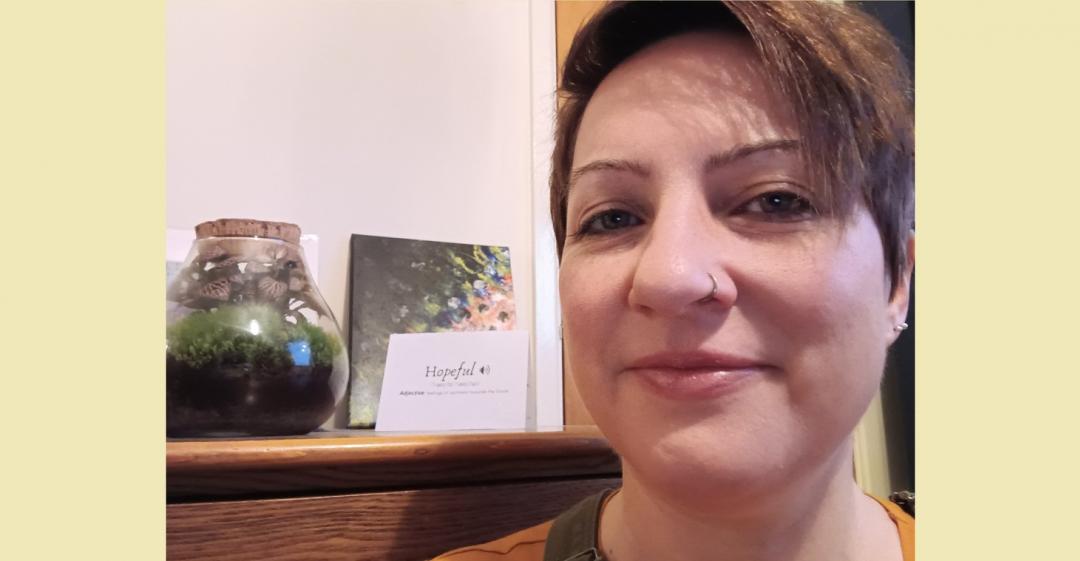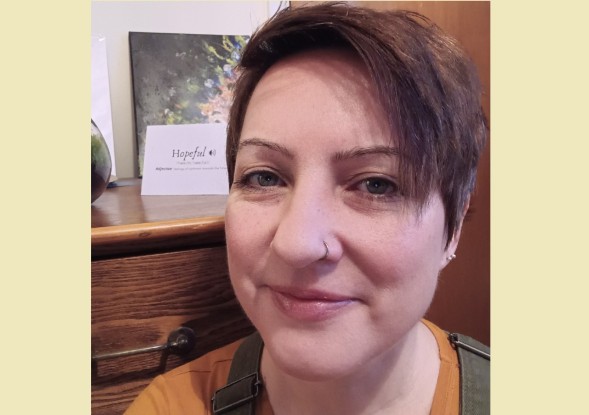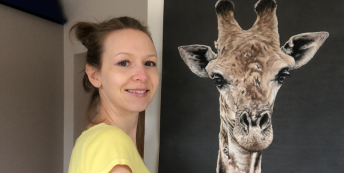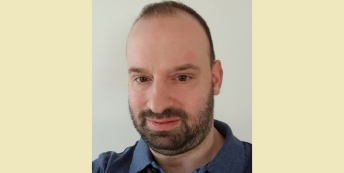“Sometimes if you stay in the same place for a long time you start to think ‘this is all I can do’.”

Newly Updated
What work were you doing previously?
I was a substance misuse youth worker in the charity sector for sixteen years.
What are you doing now?
I’m a Practice Coach for the county’s Children's Services.
I now support practitioners who are family facing in work that was similar to the work I was doing in my previous role.
This means that they get an extra layer of support that's different from supervision or peer support. I provide them a space where they can share where they're stuck, or if something at work is annoying them, and I can use coaching skills to enable them to find a solution or different ways of approaching a problem.
How did you feel in your work before you decided to make the change?
It was really rewarding.
I love working with young people and am really passionate about making sure that they feel heard.
But the other side of working in that kind of environment is that you hear quite a few stressful, upsetting things, and so you have to look after your own personal wellbeing as well.
At one point I did have a kind of burnout. I got very stressed and anxious, and had some time off work.
But my employer was really good and gradually phased me back into work, where I was well supported with my mental health and things were good.
Why did you change?
I felt ready for a change.
I knew that I had a lot of skills, but also recognise that my wellbeing is important and I have to keep myself safe as well.
There was a chance for promotion to a team management role that had less frontline work, which I thought would be a better balance for me.
I decided to apply for it, but at the same time I thought 'if I don't get the promotion, what will I do?’.
That was the time when I started to look around at other similar positions that would be a step up for me.
When was the moment you decided to make the change?
I knew that I wanted to change at this point, whether that was through getting the promotion or from a job elsewhere.
I went for the promotion and I didn't get it.
Maybe a previous version of me would have accepted it and thought that I wasn't ready for the promotion, and just continued on with my existing role.
But I'd been in a much better place looking after my own mental health and self-esteem, so I thought 'I know I can do that job, and if that's their decision that's fine but I need to be somewhere where I feel fulfiled.’
Because of the change in my attitude, I had the guts to go somewhere else.
How did you choose your new career?
I still wanted to be able to support families and young people.
But I also knew that I’m very empathetic and feel things a lot, so I do have to distance myself a little bit rather than being in the thick of it.
I started by thinking about how I could transfer some of my skills to something different.
I knew that people in similar jobs in social work can have stressful experiences and can get burnout. I wanted to help change that, as that impacts them, the families they work with, everybody.
Are you happy with the change?
Yes.
In my new role I'm still supporting families by supporting the practitioners who are doing that frontline work, so I'm still making a positive impact.
And the work-life balance is really good.
What do you miss and what don't you miss?
I miss my team, although I really like my new team as well.
Where I am now is a lot bigger, there's a different set up, so I don't see my team so much.
I don't miss the paperwork, as I do less now.
How did you go about making the shift?
I saw the role advertised when I was thinking about applying for the promotion in my old place.
It was on a children’s services website and Indeed, I think it was also advertised on LinkedIn. It was really the only role that jumped out at me, that seemed a bit different.
I checked the closing date just to see if I’d still be able to apply if I didn't get the promotion, and was glad to see that the closing date to apply was a bit longer.
I put my application in the next day and got an interview.
There was hardly any transition time between my old job to this one.
How did you develop (or transfer) the skills you needed for your new role?
I had lots of initial reading to go through to get my head into the right space for it.
They’re going to put me on a coaching course that’s specifically around coaching in the workplace.
And I have transferable skills from my old role that I can still use here.
How did you handle your finances to make your shift possible?
Before making the shift I had been worried about finances, which is why I hadn't made the change sooner.
It just so happens that the role I went for is higher paid, so making the shift was a good thing financially.
What was the most difficult thing about changing?
Being in the same place for sixteen years, it’s hard to see what else is out there in the world of work.
Sometimes if you stay in the same place for a long time you start to think 'this is all I can do'.
Taking the plunge is scary, but if you don't do it you never find out and you'll always wonder 'what if'.
Everyone's got transferable skills, so that’s what I decided to focus on.
What help did you get?
I contacted my friend who works where I work now to ask them a little more about it, which was useful.
I spoke to my manager about what went wrong in my interview for the promotion, as I wanted to know what led to that decision. It was all about the actual interview rather than my skills or experience, and that I didn't sell myself enough.
When you're trying to get a job within your current organisation, it's hard to sell yourself to people who already know you.
My manager helped by going through some of the things that I could have been stronger on.
I was very open and said that I needed to move on, and any help I could get with my interview style would be great.
My friend gave me some interview tips as well because she worked there and knew what they were looking for.
What would you advise others to do in the same situation?
Identify your transferable skills and what you can take with you.
Get clear on what you feel is important in your life when it comes to work-life balance.
Look at exactly what it is that you're not enjoying, and if a new role you’re considering will help address those things (or not).
At the bottom line is, there’ll come a point where you have to just do it. No more being scared.
We caught up with Freya recently to see how her shift was working out, two years on. Here's what she's been up to, and the biggest lessons she's learned.

What's changed for you in your career since we first published your story?
I’ve worked hard to gain a level 5 ILM certificate in Effective Coaching and Mentoring within my role as Development Coach.
This was pivotal for the role and was really important in terms of professional recognition and personal development.
I had the opportunity to work with some amazing people within and outside my organisation throughout my studies, which also helped me to recognise how I practice in my role.
I coach 121 with staff and practitioners in the service as a safe third space for them to explore their own development. These people, who work in a variety of roles, are inspiring and have deeply held values that place children and families at the heart of their work. These are attributes that I value.
I also deliver training and workshops that supports best practice and therefore better outcomes for children, young people and their families. My background experience of Youth Work has been essential for this area.
How do you feel about your work now?
I must be honest, I struggled with the transition from working directly with young people to working with practitioners who do.
However, taking a step back, listening and providing a reflective thinking space for people has shown me how important it is to slow down thinking. It has a positive impact on wellbeing, practice, and focus.
The work I do is strength based, supportive and empowering whilst offering practical tools to support their work. It's different every day.
What challenges have you come up against since making your shift, and how exactly have you dealt with them?
There have been many challenges in terms of establishing my role as purposeful and valued within the organisation.
I was worried if I’d made the right decision as it was all new and quite daunting. However, due to my dedicated team who are amazing at supporting each other, we’ve worked hard together to move this forward.
Preparation, organisational skills, time management, communication skills, listening to understand rather than listening to respond, training, supervision, networking, delivering high quality service and learning from feedback has led to a greater value placed upon my role.
I show dedication to research in content and context in workshops, and interactive delivery style to make it informative and practical. I’m sought out by others to provide training, coaching, and facilitation over again because of groundwork, preparation and experience.
Personal challenges are around my own professional development, and I am looking into routes for progression currently.
How is the financial side of things panning out, and is this what you'd expected?
I’d needed to move into a better paid role and here I am!
Of course, the cost of living has risen, but I now have breathing space. There will be funding changes which is why I need to ensure I have up to date CPD and transferrable skills to be able to accommodate this.
What have you learned, since making your shift?
So much.
I appreciate how much experience and knowledge my last role gave me and how I hadn't realised how useful this was to other people. I just assumed everyone had the same as me so was nothing special (my own voice telling me this, not anyone else's!)
Now I can see what I have to offer and appreciate my strengths in terms of how I use and build on them. I’m a skilled facilitator and have little difficulty in speaking in front of many people, as long as I am prepared.
I’ve also learned that while change is hard, scary, and unknown, it can also be exciting, challenging in a positive way, enables us to develop new skills and breathes new life where we didn't think it could.
Is there anything else you'd like to share?
I’m a woman of a certain age, and while peri-menopause affects many of us differently, I recognise that professional anxiety was heightened for me even after the change of role.
Physical things were changing, and I have periods of brain fog and mood changes. I know that this affected me in terms of self-confidence in my ability. Things can feel overwhelming.
I sought advice from my GP and found forums online to educate myself on how to manage these changes. I found support within my organisation through wellbeing services and group chats. We have a menopause policy.
Being able to explore everything so openly has felt empowering, validating and I don't feel so alone. Many successful women can go through this and it can be debilitating.
It can also be empowering to re-evaluate what’s important! It could be that extra push needed to make that change.
What lessons could you take from Freya's story to use in your own career change? Let us know in the comments below.



